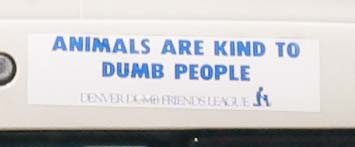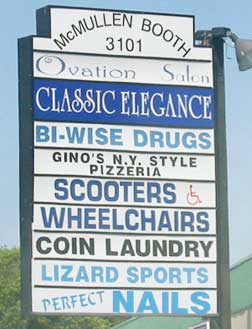…so I figure I might as well too.
I’ve never liked rap music. Yes, I do plan to talk about Serenity, but it’s going to take me a little while to get there (and no, Serenity has nothing to do with rap music, nor is there any rap music in the movie or in anything associated with the movie. Hang on).
I’ve never liked rap music, and I’ve always assumed it’s because as a musical form, it sucks. I’ve never heard anything interesting done with it. However, after Shelly and I started dating, she gave me a Linkin Park CD, and I discovered that it wasn’t the musical form that sucks; it was every rap artist I’d ever heard.
Linkin Park isn’t rap, really. Nor is it alternative, nor industrial, though it has elements of all three in it. What Linkin Park is, though, is brilliant. Technically, compositionally, and in content, it’s brilliant. The band is proof that you can take rap–one of the members of the band is a rapper, and one is the singer, and the weave spoken and sung lines together in ways that are very interesting–and do something novel with it, and rap about things other than the rapper’s cock, the rapper’s hoes, and the rapper’s ride.
When you take dissimilar forms and put them together in unexpected ways, you sometimes end up with brilliance. Part of waht makes the band Evanescence so interesting is the way they combine pop, industrial, and thrash metal; not something that sounds like it can be done well, or even at all, but something that not only works in practice, but sometimes succeeds brilliantly.
I’ve never liked Westerns, either. Like rap, every Western I’ve ever seen–which was, unfortunately, more than I would ever have liked, as my ex-inlaws loved to sit around watching Westerns during holiday get-togethers–has been about nothing interesting to me, done in a way not interesting to me, with characters and story not interesting to me. The idea of John Wayne riding into town and beating up the Indians or cattle rustlers or whatever, armed only with his six-shooter and a smarmy assurance in the superiority of the God-fearing white man? Rubbish.
Truth be told, I’m not all that fond of TV science fiction either. Most of it is rubbish as well; take Star Trek (please!). The original series broke new ground, and every series to follow plowed that same gorund, never really (with the arguable exception of Deep Space Nine in its better moments) taking any risks or trying anything new. TIME magazine had it right when they reviewed Star Trek: Voyager; their review consisted of a plot synopsis of the first half-dozen episodes or so, and the episodes of earlier Star Treks with precisely the same plots. Boring, predictable, hackneyed science fantasy with the same technobabble we’ve all seen a thousand times before, the same noble characters doing the same noble things, the same hopeless situations that the characters resolve neatly in sixty-minute chunks with time left over for commercials about laundry detergent. Trite, boring, bland, non-threatening rubbish.
When the television show Firefly was on TV, I ignored it. I had some friends who said “Oh, this show is cool! It’s science fiction!” Generally speaking, that right there is enough to make me say, “Oh, that’s cool! Pardon me while I go drive spikes into my eyes!” I’ve been consistently disappointed by TV science fiction (or, more accurately, science fantasy, or space soap opera, or whatever) to even want to go near it.
Now, Firefly isn’t, or properly wasn’t, traditional science fiction. It’s more like a science fiction western–my two least favorite television genres, with the possible exception of reality TV. The only thing I can imagine that’s more appalling than watching a science fiction western is watching a science fiction western combined with that absolutely godawful show “The Apprentice”–‘Number one, you let the cattle rustlers escape with the crate of dilithium crystals! YOU’RE FIRED!’ Gah.
Boy, did I screw the pooch. I’ve now seen about half the episodes of Firefly, and I can understand why the show was cancelled so quickly; it’s too brilliant to be on television.
Firefly has a very large main cast. Yet in spite of that, each of the main characters is vivid and three-dimensional, complex and very, very real. The dialog is coarse and gritty and beautiful. The characters are morally ambiguous; the stories are nuanced and affecting and don’t offer the audience any easy outs.
And it all succeeds brilliantly on the big screen.
First, imagine Star Wars. Now, imagine Star Wars if the rebels had well and truly lost–which, in reality, they would have. Now, imagine that the Imperial government is not evil simply for the sake of being evil–totalitarian, yes; autocratic, yes; ruthless and oppressive, yes; but made up of people, some of whom sincerely believe that they are doing the right thing by bringing civilization to the galaxy. Some of whom are doing the right thing by bringing civilization to the galaxy.
Now, picture a man living on the fringes of that society, making his way as a smuggler. Picture this man as someone willing to do whatever it takes to survive, no matter the cost. Even if that means shooting an unarmed man. Even if that means doing morally questionable things.
Even if that means doing morally reprehensible things.
In other words, Serenity is not the comic-book, black-and-white, good guys against the evil Empire pap of the Star Wars movies. It’s a study in shades of gray, and when the main characters find themselves in situations where they need to make hard choices and people will get hurt no matter what they choose, there’s no brilliant Star Trek deus ex machina or technobabble handwaving that comes along and makes everything okay. They make hard choices, and people get hurt, and people suffer, and those choices have consequences, and that’s the way it is.
A lot of people get hurt in Serenity. A lot of people suffer. A lot of people do reprehensible things, and it’s not always the bad guys who do them. Serenity is not a peaceful movie. And when people get hurt, it’s not antiseptic and clean like it is in Star Wars. There aren’t gunfights with blasters where faceless adversaries in sterile white suits fall down. It’s ugly and it’s messy and it makes you feel the consequences of these ugly, messy things.
And it doesn’t insult the audience.
If you haven’t already, go see this movie. And don’t expect to be spoon-fed a tidy story of good versus evil. In the end, there are people who survive, and people who don’t; and sometimes, the people who survive are bad people; and sometimes, the people who don’t are good people; and sometimes, people aren’t really bad or good so much as they are simply people, and they will do whatever it takes to survive.
And sometimes, there’s art in that.


